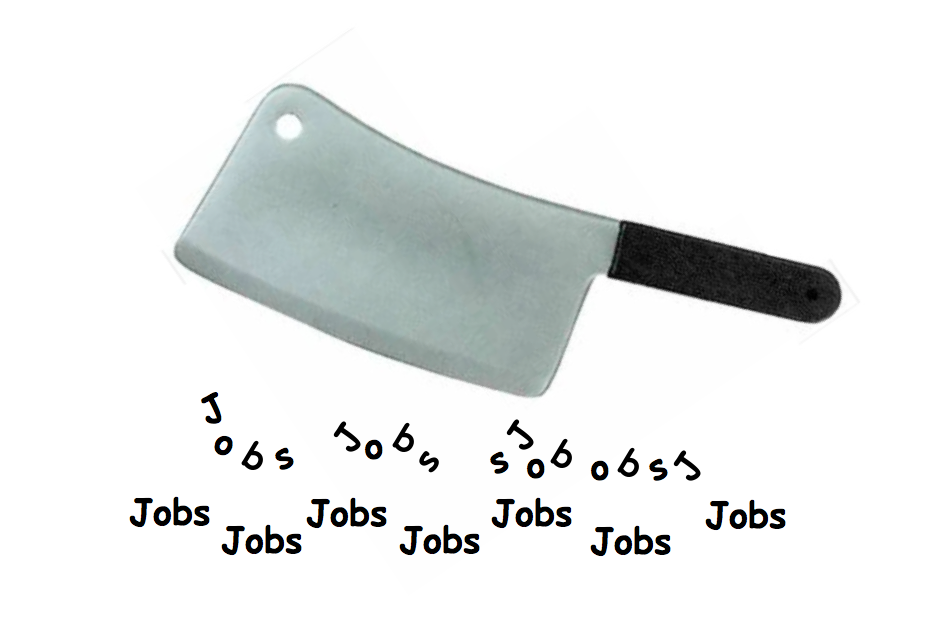Chop chop: hurry up and turn job cuts around
By John Sheridan >>
BIG BUSINESS employs people. Small business employs people. Government employs people. And scale-ups employ people.
However, you may have noticed that large organisations have been very good at getting rid of their workforce, replacing them with software over the last few years.
Banks, telcos, insurance companies, transport companies, universities and miners are all becoming more efficient (fewer staff), and steadily making thousands of people redundant to be replaced with software.
Now COVID 19 has exacerbated that problem even further.
Small businesses have no choice. It’s efficiency or shut the doors. 
Government employs huge numbers of people (thank goodness) across health, education, defence and the civil service. Keeping a lot of people in work.
Training itself is an industry that employs a lot of people. Even employment agencies employ a lot of people. (I always wonder what they really do).
But scale-ups are where the job opportunities for the future exist. Providing a fertile environment for new jobs.
Jobs working for scale-ups in agribusiness, creative industries, defence, ICT, manufacturing, medical, METS, robotics, smart trades and tourism.
JobTrainer is a good idea. But people have to be trained for the jobs of the future not the past.
JobTrainer for what? That is the dilemma.
For when 10 times more people are looking for jobs than actually exist, there is a problem. And that is not going to change quickly, just because we manage COVID-19.
Because another 'virus', the 'digital disruption virus' may not kill people, but it is ultimately just as disruptive to jobs and the economy.
The jobs 'elephant in the room' has to be addressed. There are not enough jobs. And the number of jobs diminishes every day.
JOB LOT OF MUSICAL CHAIRS
Society has accepted a bizarre game of 'musical chairs' ... with chairs disappearing steadily as time passes by.
But this is not a game. It has real consequences. Pain. Depression. Loss of meaning. Frustration. Fear of the future.
There is no point putting money and effort into training unless there is equal investment in job creation at the same time. Not just for now, but for the evolving job environment of the future, which we know about and understand.
The replacement of jobs by software has been going on for years. The coronavirus has just brought this technological disruption into greater focus.
Both disruptions create uncertainty. With its impacts.
For until there is certainty - all people (including business owners, CEOs and boards) will be conservative in their actions, investments, commitments and plans. Including hiring and employment.
So where are all the high paying jobs that we need going to come from?
They will come from our productive industries and the many scaleups in those industries.
SCALE-UPS CREATE REAL JOBS
For those who are unfamiliar with the term, scale-ups are companies, usually over three years old, that are growing – 'growth companies' with a repeatable and scalable business model.
About 50 percent of new jobs come from scale-ups. And in Australia, we know who they are and where they are. Which is a real opportunity. They are stable, and most have the capacity to grow and employ.
They can make jobs (Jobmaker). Scale-ups are Jobmakers. And they will define what training is going to be useful (JobTrainer).
The Scale-Up Report on UK Economic Growth illustrates this point clearly: “Competitive advantage doesn’t go to the nations that focus on creating companies (start-ups). It goes to the nations that focus on scaling companies”.
There is evidence that shows scale-up companies help create high-quality jobs, which are exactly the jobs we need to support if we want a sustainable and 'fair-go' country to live in.
And high quality jobs are high reward jobs, which are the precisely the jobs that the unions, state and federal governments are speaking about.
Scale-ups can provide jobs now and pathways to employment for students in high schools and universities for the future.
Scale-ups come from all sectors and regions, not just ICT.
Scale-ups are disproportionately innovative and the innovation appears to cause growth
Innovative companies grow twice as fast (in employment and sales)
Scaleups affect the surrounding business environment – a 5 percent rise in employment from high growth firms leads to a 1 percent increase in the surrounding region
WHERE ARE OUR SCALE-UPS?
We have scale-ups in all our productive industries - agriculture, creative industries, defence, education, ICT, manufacturing, medical and health, METS, robotics, smart trades and tourism.
So increasing productivity in our productive industry scale-ups offers the biggest economic benefit right now. Investing in productive industries is even better.
We have generated deep knowledge from the mining industry, which can be applied elsewhere – water, pollution control, safety, waste management, space, recycling, robotics, off road vehicle automation, defence, energy, remote control systems, AI and drones.
Much of this knowledge is valuable in countries facing similar issues to us. Especially issues with energy, water, pollution, environment, safety and remote control systems (= Export).
And we can apply that same intellectual horsepower to other industries – assistive technology, disability services, aged care, energy, waste management, soil health, aquaculture, housing, preventative medicine, manufacturing, sport and recreation (= More Export).
COVID 19 will impact our economy for years.
Digital disruption will impact our economy for decades.
Both disruptions have to be managed strategically.
Increasingly, businesses need only a small number of well-paid specialists – innovators, strategists and senior management – responsible for core business and competitive edge.
And nearly everybody else can be replaced by software, or outsourced. Which is the point so many ‘economists' miss. Software replaces, not displaces.
LET'S PUSH BACK, AUSTRALIA
We can push back and must push back. We are a rich country with many resources and in response to this challenge we should focus on building our productive industries by supporting scaleups in agriculture, creative industry, defence, education, ICT, medical and health, manufacturing, mining services, robotics, smart trades and tourism.
We can’t be passive in this event. JobSeeker and Jobkeeper have bought us a short period of time. To think. To plan. To focus.
We have created many 'hot spots' of innovation in our productive industries where we lead the world. We have established scale-ups that can grow and provide jobs. Jobtrainer should be focused on these industries.
We have to leverage our scale-ups.
The RED Toolbox – https://theredtoolbox.org – is a collaboration platform for Australian productive industry ... scale-ups.
The ED Toolbox – https://www.edtoolbox.com.au – is a sister platform for high schools to help students better plan future study and work options.
One platform leads to another. Because we don’t have to just connect industries and regions, we also need to connect generations. And expedite collaboration within silos, between silos, within states and between states and regions. Joining the brains.
ED Toolbox is about considering possibilities. RED Toolbox is about connecting and collaborating Australia’s intellectual resources to realise potential – innovation, sustainability, investment, export and future of work and jobs.
Jobkeeper. JobSeeker. JobTrainer. Jobscaler.
Used together and with vision and direction, and with a focus on our thousands of scale-ups … they could just be our way out of this mess.
About the author 
John Sheridan is CEO of Digital Business insights (DBi), an organisation based in Brisbane, Australia, which focuses on helping businesses and communities adapt to, and flourish in, the new digital world. He is the author of Connecting the Dots and getting more out of the digital revolution. Digital Business insights has been researching and analysing the digital revolution for more than 15 years and has surveyed more than 50,000 businesses, conducting in-depth case study analysis on more than 350 organisations and digital entrepreneurs. Now DBi is turning that research into action through a series of digital business development platforms, the first of which launched in 2016, the Manufacturing Toolbox. DBi has also launched a series of international online trade showcases, promoting Australian goods and services to specific countries and promoting use of those showcases in those countries. Australia's Regional Economic Development (RED) Toolbox was launched two years ago. The latest in the toolbox series is the ED Toolbox, which helps high school students, parents and educators navigate the future of work and jobs.
ends

 How to resolve AdBlock issue?
How to resolve AdBlock issue?